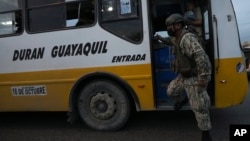Back in 1962, President John F. Kennedy noted that the United States and Ecuador are “involved in one of the great adventures in the history of this hemisphere, and indeed, the history of the human race and growth.” “Kennedy was referring to the task of building a more democratic and more progressive future for everyone living in the Western hemisphere,” said USAID Administrator Samantha Power.
“For decades, USAID has worked alongside the people of Ecuador to build schools, to build highways, water and sanitation systems, to conserve millions of hectares of precious biodiversity … to improve child and maternal health, to build stronger democratic institutions,” she said.
During her visit of Ecuador in early November, Administrator Power identified the three main priorities of the people there.
At the top of the list is security. It’s why USAID launched PILARES, a 17.7-million-dollar program “to bring together government officials, civil society organizations, and community leaders who are working to reduce crime throughout Ecuador,” said Administrator Power:
“Already, PILARES has helped nine municipalities … work with their citizens to develop and implement comprehensive strategies to reduce crime. That means not just better policing, but building more secure communities through installing community alarms, better lighting, activating neighborhood councils, and improving ways for citizens to access information on security and on self-protection that can help keep them safe.”
Second, there is a need for leaders at all levels of government to be able to meet the needs of all their people, “especially historically marginalized communities,” said Samantha Power.
USIAD’s new “Tu Municipio Responde Program – or TuMUNI for short – … will do just that, help local governments respond to citizens' needs by expanding access to water and sanitation, and other public services.”
Finally, “there is a need to expand economic opportunity for the most marginalized communities,” said Administrator Power.
So, USAID formed a new public private partnership with Ecuador's leading supermarket chain, La Favorita.
“This public private partnership is going to provide small-scale farmers with the technical assistance, the training, and the access to finance that they need to grow quality produce at the scale that is needed and at the quality that is needed to meet Corporación Favorita's sourcing requirements,” she said.
“I believe,” said Administrator Power, “that we are still on what President Kennedy called that long, great adventure – to build a more secure, more prosperous, more democratic future for all the people of this region.”














